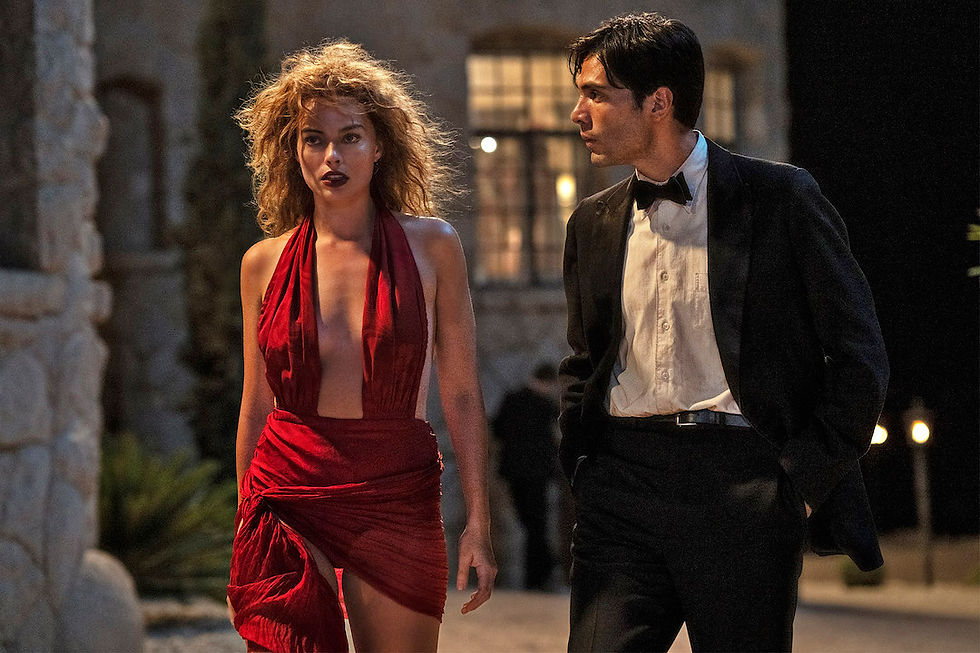Babylon
- Matthew Creith

- Dec 16, 2022
- 4 min read

"Welcome to the wonderful world of sound."
Damien Chazelle hit it out of the park with his mainstream debut feature film, "Whiplash," a tumultuous look at the psychological toll that music takes on an artist as he is pushed to his limits through abuse and a willingness to succeed in his craft. With "La La Land," Chazelle made audiences fall in love with the movie business again, transporting us to a romantic view of filmmaking and what it means to achieve greatness in a town full of pretension and facades.

"Babylon," Chazelle's visually striking attempt to paint Hollywood in a realistic light, is nothing short of a chaotic spectacle. It's an obvious combination of "Singin' in the Rain" meets "Pulp Fiction" with a mixture of "Boogie Nights" sewn in. With kinetic energy at every drum beat, "Babylon" is anything but subtle in its approach to the pitfalls of the movie industry during a time of dramatic change. Wannabe actresses were plucked off the street and became silent film stars to be admired, but their careers were seemingly obliterated overnight with the invention of sound in movies. It's a tale told on film before, but "Babylon" takes the debauchery angle up to eleven. Chazelle sets the tone by opening the movie with an elephant in the Bel Air, California desert, shitting on a guy, and the film goes from there.
Diego Calva plays Manny Torres, a Mexican-American film assistant tasked with anything and everything the film industry needs: being the ultimate gopher, getting coffee and drugs while keeping order in lavish parties for the elite in 1926 Hollywood. Margot Robbie enters the scene as Nellie LaRoy, an aspiring actress who will stop at nothing to gain fame and recognition for her perceived star quality and acting talents. Brad Pitt is Jack Conrad, a veteran silent film star beloved by fans and industry heads alike. These three have nothing in common, but they will all find themselves at crossroads as the industry transitions from the silent film era to the talkies.
The years 1926 to 1930 might not mean much to those outside the film community, but for some well-versed in its history, this period reflects a monumental shift for audiences and filmmakers of the era. Actors lost their jobs, and the moral code of 1930 forced Hollywood to clean up its image. Movie stars from the silent era couldn't keep up with the demands and expectations of new technology in sound. Their hard partying ways ended abruptly as investors in their movies wanted performers to appear wholesome on and off the screen.

The 1952 classic "Singin' in the Rain" told this same story to great comedic effect, outlining a musical spin on a time that was exceptionally challenging for some. "Babylon" treats its modern audience to an updated version of Gene Kelly's iconic film, filling it with reality, cocaine, nudity, and nostalgia. It's very extra. Borrowing much of "Singin' in the Rain's" concepts, quotes, and witty dialogue and stripping it of well-known musical numbers, "Babylon" lights a stick of dynamite and explodes thematically. Composer Justin Hurwitz fills the movie with a bombastic jazz score fitting of Damien Chazelle's filmography, and we're off to the races!
With lines like, "Frankly Scarlett, you're a cunt” and "She's the one having sex with the ice sculpture," "Babylon" presents a side of early Hollywood, unlike anything we have seen depicted on film before. Margot Robbie, in particular, takes everything she has in her arsenal to demonstrate how powerful an actor she can be. Robbie convinces everyone around her that Nellie LaRoy belongs in the spotlight, despite the fact that Nellie doesn’t play well with others. Her chemistry with Diego Calva’s Manny is believable, which helps to lift Calva as the lead of a movie full of an ensemble cast that includes Jean Smart, Lukas Haas, Max Minghella, Li Jun Li, Olivia Wilde, Samara Weaving, and Jovan Adepo. Brad Pitt is very likable akin to his character in "Inglourious Basterds," similarly accented and highlighting the downturn actors of his generation experienced when audiences no longer wanted them.

For a movie that registers at three hours in length, a few sequences aren't needed to drive the film forward. Producer Tobey Maguire appears in an extended scene that proves disastrous for many of the characters involved, and it brings the movie down a rabbit hole that is almost unforgivable. But Chazelle is able to pull his film back from Maguire's grip just in time to close "Babylon" out on a high, albeit sappy, note.
Movie lovers will take to "Babylon" with a great deal of admiration, while others might struggle to notice how much it resonates within the film industry as part of historical importance. With outstanding performances from Margot Robbie, Diego Calva, and Jean Smart, "Babylon" makes its mark during awards season. Damien Chazelle proves to be a worthy contender once again as a director who understands the themes laid out before him, complimented by an original score by Justin Hurwitz that will stay with you long after the end credits roll.
Ticket Rating: 🎟🎟🎟🎟






Comments